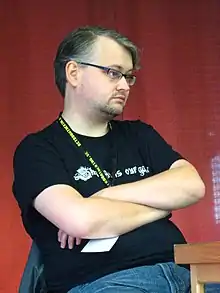Johan Andersson (game developer)
Johan Andersson is a Swedish video game designer and studio manager for Paradox Tinto, a Barcelona-based division of Paradox Interactive.
Johan Andersson | |
|---|---|
 Andersson at Retro Gathering in 2009 | |
| Born | 28 August 1974 |
| Nationality | Swedish |
| Occupation | Studio lead of Paradox Tinto |
| Known for | Designing grand strategy games |
Career
Before working for Paradox Interactive, he was an employee of Funcom where he worked as a programmer for Sega Genesis games, such as Nightmare Circus and NBA Hangtime.[1] He began working at what would later become Paradox Interactive in 1998, joining the original team that had been developing Europa Universalis.[2][3]
Although he began his career as a programmer, Andersson later became a designer and producer at Paradox Development Studio, working on grand strategy games such as Hearts of Iron III, Crusader Kings II, Victoria II, Europa Universalis IV, Stellaris, and Imperator: Rome.[4]
Andersson's design philosophy is "to create believable worlds."[5]
In June 2020, he became the lead of Paradox Tinto, a newly established studio based in Barcelona.[6]
References
- "Interview: Johan Andersson On Hearts Of Iron 3". Rock Paper Shotgun. Archived from the original on 9 November 2010. Retrieved 17 November 2012.
- "Paradox Development Studio - A Brief History". Paradox Interactive Forums. Archived from the original on 5 March 2021. Retrieved 17 June 2021.
- "Inside Paradox, the strangest company in video games". eurogamer. 25 September 2013. Archived from the original on 9 April 2015. Retrieved 20 March 2015.
- "Imperator: Rome is the next grand strategy game from Paradox". Archived from the original on 7 December 2019. Retrieved 19 May 2018.
- "Dev Box Interview: Paradox Interactive's Producer Johan Andersson : TrueGameHeadz .:Video Game Previews, Reviews, Videos and News For Gamers Everywhere". TrueGameHeadz. Archived from the original on 2 May 2009. Retrieved 17 November 2012.
- Sinclair, Brendan. "Paradox opening Barcelona studio". GamesIndustry.biz. Archived from the original on 6 June 2020. Retrieved 1 June 2020.